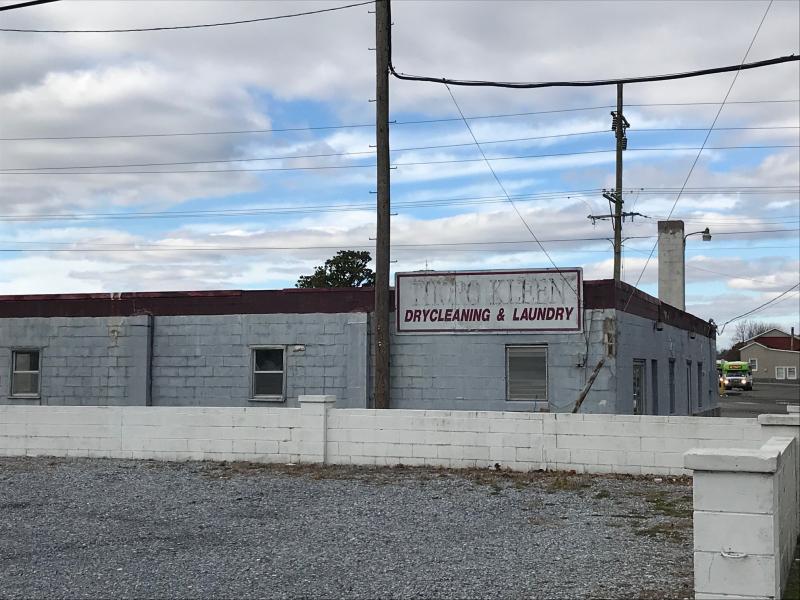Joe Booth in battle over Georgetown property
Former Delaware Sen. Joe Booth is in a protracted battle with Delaware Department of Natural Resources and Environmental Control over cleanup of a former dry cleaning property Booth and his wife own in Georgetown.
The Booths, Joe and Margaret, dropped an appeal with the state Environmental Appeals Board Nov. 27 after the board denied a continuance on an appeal of a decision by DNREC Secretary Shawn Garvin. Garvin ordered the Booths to submit a plan and clean up the site of Thoro-Kleen Dry Cleaning and Laundry at 11 Railroad Ave. in Georgetown. DNREC has determined that the site contained hazardous substances, including perchloroethylene, or PCE, a colorless liquid used in dry cleaning.
The Booths are continuing to fight a lawsuit filed against them by DNREC in Delaware Superior Court.
According to the environmental protection agency, PCE was used in dry-cleaning and metal degreasing operations. PCE is a nonflammable liquid that looks like water, but is much denser and can contaminate groundwater. The EPA says exposure to PCE can result in neurological problems, liver damage and increased risk of cancer.
History of the case
The roots of all this date to 1986, when Joe and Margaret Booth purchased the Thoro-Kleen property from Joe’s parents. Garvin’s order, dated Oct. 31, 2017, says DNREC made the Booths aware as early as 1985 that potential sources of hazardous materials, namely PCE, were on the site.
In 2010, DNREC says it again investigated the site and found PCE and another chemical, trichloroethylene, or TCE, also used in dry-cleaning, in the groundwater. Thoro-Kleen ceased operations in late 2010, although the Booths continue to own the land.
In early 2014, DNREC said it sent a notice to the Booths for their liability for the site. Later that year, DNREC determined the PCE and TCE levels in the groundwater at the site exceeded Environmental Protection Agency levels.
The Booths submitted a voluntary cleanup application with DNREC in March 2015, but a year later, DNREC said an investigation again revealed the presence of PCE and TCE in the site’s groundwater.
In early 2017, the Booths’ attorney submitted letters saying his clients were innocent purchasers of the property, who did not know hazardous materials were on site at the time they bought the land. DNREC disputed that assertion and Garvin, in a verbal statement, stood by investigators’ findings. Garvin’s statement was released in a May 23, 2017 letter.
The Booths appealed their innocent purchaser claims to the Environmental Appeals Board; the appeal was originally scheduled for November 2017 but was rescheduled to April 10.
That appeal was dismissed after the board ruled the Booths did not file their appeal in time.
On Oct. 31, 2017, Garvin put out a second order asking the Booths to come up with a consultant to investigate the property, submit a draft work plan, conduct a feasibility study, pay response costs and implement an action plan. The order also provided a stay of enforcement until July 26, which DNREC says the Booths were notified of.
On Oct. 11, DNREC filed a lawsuit against the Booths for not complying with Garvin’s order. The department is seeking an award of three times its costs plus civil penalties of $1,000 to $10,000 per day from Sept. 28 to the conclusion of the litigation.
The Booths have filed to dismiss the suit, saying that DNREC has failed to state a claim and Garvin’s order never went into effect. Their attorney, Chris Coggins, said DNREC is harassing the Booths and trying to increase the cost of litigation. In legal filings, Coggins said the demands of the order are being completed by contractor Ten Bears Environmental.
Oral argument on the lawsuit is scheduled for 1:30 p.m., Friday, Dec. 14, in Delaware Superior Court in Dover.
Appeal withdrawn
Meanwhile, the Nov. 27 appeals board hearing on Garvin’s order went on as scheduled. It began with Coggins asking the board for a continuance, citing the multiple matters of litigation the Booths are involved in. He said cleanup of the site is ongoing and that the Booths plan to donate the property to a local church.
“There’s no reason to fight with DNREC when the property is being cleaned up,” he said.
However, Coggins also accused DNREC of using “every trick in the book to bully the Booths.”
DNREC attorney Robert Phillips said the Booths brought all this on themselves, and have refused offers to consolidate the cases. “They have created that problem themselves,” he said.
The board agreed with DNREC again, denying the Booths motion for a continuance and moved to go forward with the appeal. On appeal, the board would have the option to either affirm or deny Garvin’s decision, or they could have remanded it back with recommendations for changes. Coggins sought to determine whether the appeals board ruling would affect the Superior Court case. The board said they could not speak for the court or give legal advice on how to move forward.
The Booths and their counsel then asked for a brief recess to discuss legal strategy. When they came back, Coggins asked the board to withdraw their appeal.
Ryan Mavity covers Milton and the court system. He is married to Rachel Swick Mavity and has two kids, Alex and Jane. Ryan started with the Cape Gazette all the way back in February 2007, previously covering the City of Rehoboth Beach. A native of Easton, Md. and graduate of Towson University, Ryan enjoys watching the Baltimore Ravens, Washington Capitals and Baltimore Orioles in his spare time.























































